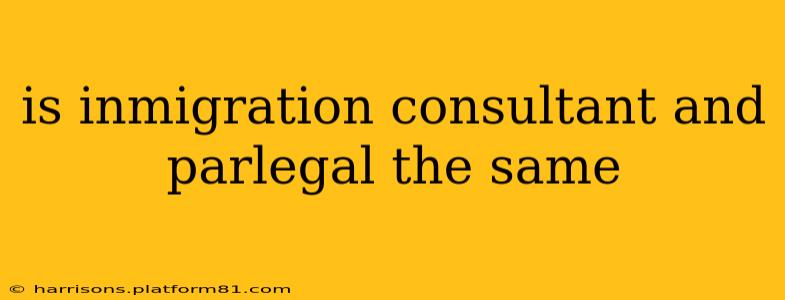Immigration Consultant vs. Paralegal: Are They the Same?
The terms "immigration consultant" and "paralegal" are often confused, leading to uncertainty about the services each provides and the qualifications they possess. While both professions may assist individuals navigating the immigration process, they are distinctly different roles with varying levels of legal expertise and authority. This article clarifies the key differences and helps you understand which professional might be best suited for your needs.
What is an Immigration Consultant?
An immigration consultant provides advice and assistance related to immigration matters. The specific services offered vary widely depending on their experience and the country's regulatory framework. Some consultants may help with paperwork, applications, and gathering supporting documents. Others may offer more comprehensive services, such as strategic planning and representation during interviews. It's crucial to understand that immigration consultants generally do not have the legal authority to represent you in court or before immigration authorities. Their role is primarily advisory and supportive. The regulations governing immigration consultants differ significantly by country; in some jurisdictions, the profession is highly regulated, while in others, there is minimal oversight.
What is a Paralegal?
A paralegal, on the other hand, is a trained legal professional who works under the supervision of a lawyer. Paralegals assist lawyers with various legal tasks, including research, document preparation, client communication, and investigation. In the context of immigration, a paralegal working for an immigration lawyer can provide significant assistance with legal processes. They can help prepare applications, gather evidence, conduct research, and communicate with clients and government agencies. However, paralegals, like immigration consultants, cannot represent clients in court or give legal advice without the direct supervision of a licensed attorney.
What are the Key Differences?
The core difference lies in their legal authority and scope of practice. Here's a summary:
| Feature | Immigration Consultant | Paralegal (working for an immigration lawyer) |
|---|---|---|
| Legal Authority | Generally, cannot represent clients legally or give legal advice | Works under attorney supervision; cannot provide legal advice independently |
| Supervision | Typically works independently | Works under the supervision of a licensed attorney |
| Education/Training | Varies widely; may or may not have formal training | Typically requires formal education or certification |
| Scope of Practice | Primarily administrative and advisory services | Assists an attorney with legal tasks and procedures |
| Representation | Cannot represent clients before immigration authorities | Can assist in preparing for representation by a lawyer |
Can an Immigration Consultant Help with My Case?
Whether an immigration consultant is appropriate for your situation depends on the complexity of your case and the level of support you need. For straightforward applications, a consultant might suffice. However, for complex legal issues or potential challenges, you should seek representation from a licensed immigration lawyer. Always verify the consultant's credentials and experience before engaging their services.
When Should I Consult a Paralegal or Immigration Lawyer?
For complex legal situations, such as appeals, deportation proceedings, or cases with significant legal challenges, a licensed immigration lawyer is essential. A paralegal can be a valuable asset in assisting the lawyer, but ultimately, the lawyer holds the responsibility for representing you legally. If you require assistance with preparing documents, organizing evidence, or understanding legal procedures, a paralegal working under an immigration lawyer's supervision can provide significant support.
What are the potential risks of using an unqualified immigration consultant?
Using an unqualified immigration consultant carries several risks, including:
- Incorrect advice leading to application rejection: Inaccurate information or improperly filed documents could result in delays or denials.
- Financial loss: You may pay for services without receiving appropriate support or representation.
- Legal issues: Unqualified consultants may engage in unethical or illegal practices.
In conclusion, while both immigration consultants and paralegals can offer assistance with immigration processes, it's vital to understand their distinct roles and limitations. Choose the professional best suited for your specific needs and always prioritize working with qualified and reputable individuals. If you have complex legal matters, consulting with a licensed immigration lawyer is strongly recommended.
